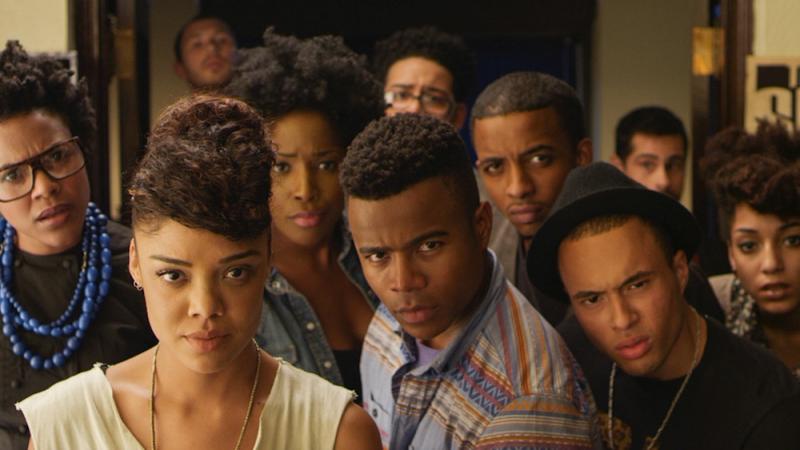Dear White People | reviews, news & interviews
Dear White People
Dear White People
Sophisticated, witty look at identity politics on fictional US Ivy League campus

US films about and aimed at African Americans broadly fall into two categories: gangsta life in the ‘hood action flicks and broad comedies, the latter niche dominated by Tyler Perry, who does for Black Americans what Mrs Brown does for Irish women. Dear White People, on the other hand, is a sophisticated social satire in the vein of Spike Lee’s early She’s Gotta Have It or Bamboozled.
Like Lee’s School Daze, Dear White People explores the contradictions and pressures facing what Harlem Renaissance writer WEB Du Bois termed the “talented tenth”, the cadre of educated, exceptional black youth he thought would provide a leadership class for the entire race – how much should they embrace their privilege and assimilate, how “black” should they be to keep it real, how much do they owe the wider community. It also considers how much young white people’s appropriation of hip-hop culture (embodied in a particularly egregious wigga from Vermont) is based on genuine admiration or the propagation of a demeaning stereotype.
 Strung out along the ideological spectrum are four students at elite Winchester, a mythical Ivy League school: Sam (Tessa Thompson), an acerbic cultural critic and activist (“it’s like Spike Lee and Oprah had a pissed-off baby,” one adversary describes her) whose blacker-than-thou stance may spring from her ambivalence about her own middle-class bi-racial upbringing; handsome, smooth, ambitious Troy (Brandon P Bell), a secret pothead destined for law school and a political career by his father, the University’s Dean of Students (24’s Dennis Haysbert), who constantly pressures Troy to be whiter-than-white, as it were; the fiercely ambitious Coco (Teyonah Parris, pictured above), who disguises her hood roots under a straight weave and preppy clothes and who wants money, fame, and to live in the rich white kids’ dorm; and quiet observer Lionel (Tyler James Williams), triply marginalized as black, gay and (primarily) a nerd, who doesn’t feel he fits in anywhere. Like many who rally to no particular flag, he ends up a journalist.
Strung out along the ideological spectrum are four students at elite Winchester, a mythical Ivy League school: Sam (Tessa Thompson), an acerbic cultural critic and activist (“it’s like Spike Lee and Oprah had a pissed-off baby,” one adversary describes her) whose blacker-than-thou stance may spring from her ambivalence about her own middle-class bi-racial upbringing; handsome, smooth, ambitious Troy (Brandon P Bell), a secret pothead destined for law school and a political career by his father, the University’s Dean of Students (24’s Dennis Haysbert), who constantly pressures Troy to be whiter-than-white, as it were; the fiercely ambitious Coco (Teyonah Parris, pictured above), who disguises her hood roots under a straight weave and preppy clothes and who wants money, fame, and to live in the rich white kids’ dorm; and quiet observer Lionel (Tyler James Williams), triply marginalized as black, gay and (primarily) a nerd, who doesn’t feel he fits in anywhere. Like many who rally to no particular flag, he ends up a journalist.
The film follows their different strategies for navigating the identity politics minefield of the modern American university, and, like all college students, learning to reconcile idealistic theory with messy reality. For Sam especially, the situation becomes complicated when she begins a relationship with a white grad student who truly appreciates her.
 Simien’s own attitudes are thankfully equally complex, with characters of all races (including the Asian girl who comes to the Black Student Union meetings because “you have better snacks”) presented as individuals, not stereotypes (the director, pictured above).
Simien’s own attitudes are thankfully equally complex, with characters of all races (including the Asian girl who comes to the Black Student Union meetings because “you have better snacks”) presented as individuals, not stereotypes (the director, pictured above).
The complexity is less helpful when it comes to the plot, which tries to pull together, among several other strands, Coco’s determination to impress the producer of a proposed reality show set at the university ("Black Face in A White Place”) and the ongoing rivalry between the Dean and the University’s President, a conflict passed down to their sons, Troy and the entitled Kurt (Kyle Gallner), editor of the campus humour magazine Pastiche, explicitly referenced as an equivalent of the Saturday Night Live-feeder Harvard Lampoon. Indeed, in some ways the film is a love/hate riposte to the granddaddy of college comedies and similarly acute examination of undergrad social structures, Lampoon offspring Animal House.
All these elements come to a head when Coco mischievously suggests a hip-hop theme for Pastiche’s annual Halloween party. White revellers turn up in blackface, the Black Student Union gets wind of this, and, as Harry Hill might say, Fiiiight! And if anyone thinks this concept is far-fetched, headlines about actual blackface parties at American universities, including Ivy League Dartmouth, accompany the end credits.
Dear White People embodies the virtues of the truly independent film, substituting strong writing, good performances from a largely unfamiliar cast, and a fresh, distinctive vision for the blockbuster’s hefty budget. Besides Lee, the film evokes fellow independents Wes Anderson, another user of title cards and classical music for ironic effect, and Whit Stillman, no less a dissector of privilege and purveyor of witty aperçus. It can only be hoped that these qualities will help it find the audience it deserves even with a UK public less familiar with the many American-centric cultural references and the US’s complex racial ecology.
Overleaf: watch the trailer for Dear White People
rating
Share this article
The future of Arts Journalism
You can stop theartsdesk.com closing!
We urgently need financing to survive. Our fundraising drive has thus far raised £33,000 but we need to reach £100,000 or we will be forced to close. Please contribute here: https://gofund.me/c3f6033d
And if you can forward this information to anyone who might assist, we’d be grateful.

Subscribe to theartsdesk.com
Thank you for continuing to read our work on theartsdesk.com. For unlimited access to every article in its entirety, including our archive of more than 15,000 pieces, we're asking for £5 per month or £40 per year. We feel it's a very good deal, and hope you do too.
To take a subscription now simply click here.
And if you're looking for that extra gift for a friend or family member, why not treat them to a theartsdesk.com gift subscription?
more Film
 Big Star: The Nick Skelton Story review - the ways of a man with his mount
Documentary about the champion showjumping duo
Big Star: The Nick Skelton Story review - the ways of a man with his mount
Documentary about the champion showjumping duo
 Ballerina review - hollow point
Ana de Armas joins the Wick-verse to frenetic but soulless effect
Ballerina review - hollow point
Ana de Armas joins the Wick-verse to frenetic but soulless effect
 Blu-ray: Eclipse
The BFI has unearthed an unsettling 1977 thriller starring Tom Conti and Gay Hamilton
Blu-ray: Eclipse
The BFI has unearthed an unsettling 1977 thriller starring Tom Conti and Gay Hamilton
 The Ballad of Wallis Island review - the healing power of the old songs
Estranged folk duo reunites in a classy British comedy drama
The Ballad of Wallis Island review - the healing power of the old songs
Estranged folk duo reunites in a classy British comedy drama
 The Salt Path review - the transformative power of nature
Marianne Elliott brings Raynor Winn's memoir to the big screen
The Salt Path review - the transformative power of nature
Marianne Elliott brings Raynor Winn's memoir to the big screen
 Bogancloch review - every frame a work of art
Living off grid might be the meaning of happiness
Bogancloch review - every frame a work of art
Living off grid might be the meaning of happiness
 When the Light Breaks review - only lovers left alive
Tender close-up on young love, grief and growing-up in Iceland
When the Light Breaks review - only lovers left alive
Tender close-up on young love, grief and growing-up in Iceland
 Blu-ray: Strange New Worlds - Science Fiction at DEFA
Eye-popping Cold War sci-fi epics from East Germany, superbly remastered and annotated
Blu-ray: Strange New Worlds - Science Fiction at DEFA
Eye-popping Cold War sci-fi epics from East Germany, superbly remastered and annotated
 Mongrel review - deeply empathetic filmmaking from Taiwan
Artful direction and vivid detail of rural life from Wei Liang Chiang
Mongrel review - deeply empathetic filmmaking from Taiwan
Artful direction and vivid detail of rural life from Wei Liang Chiang
 The Phoenician Scheme review - further adventures in the idiosyncratic world of Wes Anderson
Benicio del Toro's megalomaniac tycoon heads a star-studded cast
The Phoenician Scheme review - further adventures in the idiosyncratic world of Wes Anderson
Benicio del Toro's megalomaniac tycoon heads a star-studded cast
 Mission: Impossible - The Final Reckoning review - can this really be the end for Ethan Hunt?
Tom Cruise's eighth M:I film shows symptoms of battle fatigue
Mission: Impossible - The Final Reckoning review - can this really be the end for Ethan Hunt?
Tom Cruise's eighth M:I film shows symptoms of battle fatigue

Add comment